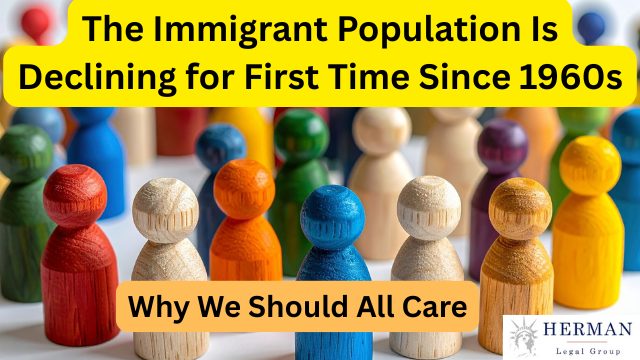By Richard T. Herman, Immigration Attorney | October 30, 2025
A new rule affecting employment-based visa applicants has recently been announced. This policy change was administration implemented to address evolving priorities in immigration processing and security.
Under the Trump administration, stricter vetting procedures and additional documentation requirements were introduced. In contrast, the former administration had prioritized streamlining processes for immigrant convenience, whereas the current administration has shifted focus toward enhanced security and thorough screening.
At a Glance
The Department of Homeland Security (DHS) has issued a new rule eliminating the automatic 540-day extension of Employment Authorization Documents (EADs) for renewal applicants. Effective October 30, 2025, the rule affects millions of workers and employers nationwide — forcing many lawful immigrants off payroll while renewals remain stuck in backlogs, often due to bureaucratic delays caused by government inefficiencies and administrative mismanagement.
According to the USCIS official announcement, the change takes effect immediately — without prior notice or public comment, making timely filing of renewal applications crucial to avoid lapses in work authorization.

Background: The 540-Day Lifeline — Now Gone
Under the Biden administration’s 2024 regulation, USCIS automatically extended EAD validity by up to 540 days to prevent disruptions caused by chronic agency delays. This rule was an example of a policy the administration implemented to address processing backlogs and provide stability for both employers and employees. That rule, finalized less than a year ago, was hailed by employers as a “common-sense reform” that stabilized workplaces while USCIS modernized its processing system.
Now, the Trump administration’s DHS — led by Secretary Kristi Noem — has abruptly revoked that safeguard. DHS states that ending automatic extensions is aimed at ensuring national security and better screening of aliens. According to DHS, these changes are necessary to ensure national security by requiring appropriate vetting of applicants before granting employment authorization. The previous policy, they argue, prioritized aliens convenience ahead of security concerns.
Essential Info: What the New Rule Does About Automatic Extension
| Feature | Old (Biden 2024) | New (Trump 2025) |
|---|---|---|
| Automatic EAD extension | Up to 540 days | Eliminated for renewals filed on/after Oct 30 2025 |
| Eligible categories | H-4 spouses, L-2/E dependents, asylum, TPS, adjustment, more | Most lose auto-extension unless protected by statute or Federal Register notice |
| Filing window | 180 days before expiration | Same window — but no work allowed after card expires without new EAD; tracking EAD expiration is critical to avoid gaps in employment authorization |
| Notice-and-Comment | Full public comment period | Skipped entirely — implemented immediately |
When authorization expires, individuals must stop working until a new EAD is issued.
(Sources: USCIS, Fragomen LLP, Clark Hill PLC)
The new rule eliminates the automatic extension of employment authorization for most categories, meaning employees cannot work after their EAD expiration unless they have received a new card. The EAD application process becomes even more important, as timely and accurate EAD applications are now required to avoid employment interruptions.
Previously, automatic extensions allowed continued work while a renewal was pending, but now, a renewal request must be approved before employment can continue. This change means that for each new period of employment authorization, proper vetting and timely filing are essential.
It is now crucial for employees to possess a valid EAD at all times to maintain employment eligibility.
Fast Fact
Roughly 1.8 million immigrants currently hold EADs under the categories affected by this rule, according to the Migration Policy Institute.
Employment Authorization Document Requirements
The Department of Homeland Security (DHS) has set forth detailed requirements for Employment Authorization Documents (EADs) to ensure that foreign nationals are properly vetted before being granted the right to work in the United States. Under the Immigration and Nationality Act (INA), certain employment authorization categories—such as those for Temporary Protected Status (TPS), asylum applicants, and adjustment of status applicants—have historically benefited from automatic extensions of their EADs while renewal applications were pending.
However, the Trump administration’s interim final rule (IFR) amends DHS regulations, ending the practice of automatically extending EAD validity for many renewal applicants. This new rule, published in the Federal Register, eliminates the automatic extension period that previously allowed EAD renewal applicants to continue working for up to 540 days after their current EAD expired, provided they had a timely filed renewal application with U.S. Citizenship and Immigration Services (USCIS).
To maintain work authorization under the new requirements, foreign nationals must ensure their renewal applications are submitted as early as possible—up to 180 days before their current EAD expires. USCIS processing times for EAD renewal applications can be unpredictable, and without the safety net of automatic extensions, any delay could result in a gap in employment authorization. This means that if a renewal application is not approved before the expiration date stated on the current EAD, the individual must stop working until a new EAD is issued.
The interim final rule places a renewed emphasis on national security and public safety, requiring robust alien screening and proper vetting before granting or extending employment authorization. While certain renewal applicants—such as those with TPS-related employment documentation or those covered by specific federal register notices—may still benefit from automatic extensions, most categories will no longer be automatically extended unless specifically provided for by law or an applicable federal register notice. EADs that were automatically extended prior to the effective date of the new rule will not be affected, but all renewal applications filed on or after the rule’s implementation are subject to the new requirements.
For employers, this change underscores the importance of monitoring the expiration dates of employees’ EADs and ensuring that all workers have valid employment authorization documents at all times. Failure to comply with these requirements can result in significant penalties and compliance risks under federal law.
The elimination of automatic extensions for EADs marks a significant shift in immigration services policy, with far-reaching implications for both foreign nationals and U.S. businesses. As the Department of Homeland Security continues to update its regulations, staying informed about the latest federal register notices and understanding the requirements for each employment authorization category is essential. Both individuals and employers should consult with experienced immigration counsel to navigate these changes, minimize the risk of work authorization gaps, and ensure compliance with all DHS regulations.
Impact on Workers, Families, and Employers: Employment Authorization Documents
Without the 540-day buffer, a lawful worker whose EAD renewal remains pending at USCIS must stop working the day their current card expires — even if the delay is entirely the government’s fault.
Expert Commentary
“Behind every expiring work permit is a human being — a teacher, a nurse, a software engineer — whose family now faces the possibility of lost income and forced unemployment because of bureaucratic delay. This rule punishes law-abiding immigrants for USCIS’s inefficiency.”
— Richard T. Herman, Immigration Attorney
Under the new rule, an alien’s employment authorization will no longer be automatically extended, making it critical for individuals to ensure timely and proper vetting of their applications. For certain categories of workers, employment may be authorized incident to status, meaning their ability to work is directly tied to their underlying immigration status, and their employment authorization may continue until their status expires. Additionally, USCIS will no longer accept receipt notices as valid evidence of employment authorization for renewal applications filed on or after October 30, 2025.
This change affects individuals whose employment authorization is dependent on their immigration status or nonimmigrant status, such as those holding temporary visas or pending applications, as their right to work is contingent on maintaining valid status and timely EAD renewals.
By contrast, individuals with permanent residence or those who are lawful permanent residents are not affected by EAD expiration, as they have unrestricted work authorization in the United States.
Families
Spouses of H-1B, L-1, and E-visa holders (especially H-4 EAD holders) are often the primary breadwinners. Many of these individuals are foreign national spouses whose eligibility for employment authorization is critical to their family’s stability. A lapse of even 30 days can devastate family finances, interrupt healthcare coverage, and threaten home ownership. The rule will affect hundreds of thousands of workers across multiple immigration categories each year who rely on EADs as work authorization. This includes F-1 students participating in optional practical training (OPT) and those in the STEM optional practical training (STEM OPT) program, who may face employment gaps or stricter renewal timelines due to changes in EAD extension policies.
Employers
Ohio hospitals, universities, and tech firms — as well as national employers — now face:
- Unexpected staffing gaps as lawful workers lose authorization mid-project. Employers must also track the status of each employee’s ead renewal application to anticipate potential lapses in work authorization.
- Compliance liability under Form I-9 rules, especially with renewal ead applicants who may be affected by changes in automatic extension policies and processing delays.
- Lost productivity and recruiting costs as trained employees are sidelined. Employers must monitor the expiration dates of their employees’ EAD cards and terminate employees who cannot produce a new card by the expiration date.
Additionally, employers should be aware that the vetting process for employment authorization can impact the timing and eligibility of automatic extensions, increasing the importance of diligent compliance and recordkeeping.
Communities
Public schools, clinics, and manufacturers that depend on immigrant professionals will see ripples of economic loss — from reduced tax revenues to service disruptions. In addition to economic concerns, the rule change is also justified by citing public safety threats and other national security considerations, as policymakers emphasize the need to vet and screen individuals to protect the United States.
Legal Vulnerabilities: Why This Rule May Be Unlawful
1. Violation of the Administrative Procedure Act (APA)
The APA (5 U.S.C. § 553) requires federal agencies to provide public notice and an opportunity for comment before implementing major rules. Here, DHS skipped that process, invoking “good cause” without evidence of emergency.
Legal experts say this shortcut makes the rule vulnerable to being vacated in court.
2. Arbitrary and Capricious Standard
Under Motor Vehicle Mfrs. Ass’n v. State Farm (1983), an agency reversing policy must provide a “reasoned explanation for its action.” Because the 2024 Biden rule is less than a year old, courts will demand that DHS explain “what changed.”
So far, the new rule offers no fresh data — only a vague reference to vetting concerns. Ending automatic extensions of EADs results in more frequent vetting of aliens who apply for employment authorization. Proper screening is now emphasized as a necessary step before granting employment authorization, aiming to ensure security, prevent fraud, and maintain compliance with legal standards.
USCIS Director Joseph Edlow has stated that these changes are intended to enhance vetting and security measures, reinforcing the agency’s commitment to thorough review during the employment authorization process.
“This is another example of immigration policy being used as a weapon of deterrence rather than a tool of economic growth. Instead of fixing backlogs, DHS has chosen to freeze lawful workers out of their jobs.”— Richard T. Herman, Immigration Attorney
3. Reliance Interests Ignored
In Department of Homeland Security v. Regents of the Univ. of California (2020) (the DACA case), the Supreme Court held that agencies must consider “reliance interests” when reversing policy.
Millions of workers and businesses planned their staffing and finances around the 540-day extension; DHS’s failure to acknowledge those interests could render the rule unlawful.
4. Potential Constitutional Due Process Claims
Workers who lose jobs and benefits without fault of their own may assert a property interest in their lawfully issued EAD — opening the door to Fifth Amendment due-process arguments.
Economic and Social Fallout
| Sector | Impact | Ohio Example |
|---|---|---|
| Healthcare | Staffing shortages; license interruptions for foreign-trained nurses and physicians. When EAD expiration occurs and authorization expires, workers must stop working immediately, causing critical gaps in care. | Cleveland Clinic, UH Health |
| Higher Education | Loss of research assistants and faculty on pending EADs. EAD expiration or when authorization expires leads to sudden loss of employment authorization, disrupting ongoing research and teaching. | Ohio State University |
| Tech & Engineering | Work stoppages among H-4 spouses in STEM fields. If EAD expiration is reached and authorization expires, employees must be removed from payroll, impacting project timelines. | Columbus & Cincinnati tech clusters |
| Manufacturing | HR compliance costs and productivity loss. EAD expiration and authorization expiration require immediate reverification and termination if not renewed, increasing administrative burden. | Akron, Toledo auto suppliers |
The loss of an alien’s employment authorization due to EAD expiration or when authorization expires can result in immediate job loss, disrupt business operations, and reduce workforce stability across Ohio’s key sectors.
Important Note
The rule applies only to renewal filings on or after October 30, 2025. Those who file earlier retain their extension rights. But many immigrants — unaware of the change or unable to file early — will lose their jobs nonetheless.
Law Firm Comparison: Top Immigration Counsel
| Firm | Overview & Specialties | Geographic Focus |
|---|---|---|
| Herman Legal Group | Led by Richard T. Herman (30 + yrs); national reach; deep expertise in EAD renewal, I-9 compliance, and business immigration. Visit Herman Legal Group. | Cleveland HQ with offices in Columbus, Detroit, Chicago; multilingual team. |
| Porter Law Office LLC | Business immigration and EAD litigation. Visit Ohio Immigration Counsel. | Columbus-based, statewide. |
| Shihab & Associates | Corporate and family immigration practice with offices in Columbus and Cleveland. Visit Shihab Immigration Firm. | Ohio and national reach. |
| Rodriguez Bell & DiFranco Law | Bilingual firm with strong EAD renewal focus. Visit RBD Immigration Law. | Cleveland & Columbus. |
Call to Action
If you or your company employ immigrants on EADs, act now.
Schedule a consultation with the Herman Legal Group to assess risk and plan renewals before deadlines.
“Despite the setbacks, we will keep fighting for immigrants — in the courts, in Congress, and in our communities. The promise of America has always been opportunity, not obstruction.”
— Richard T. Herman, Founder, Herman Legal Group
Key Takeaways
- DHS’s October 30 rule eliminates automatic EAD extensions, risking job losses for hundreds of thousands.
- The rule may be legally vulnerable for skipping notice-and-comment and ignoring reliance interests.
- Employers face heightened I-9 risk and must update procedures immediately.
- Families could lose income and health coverage while awaiting delayed renewals.
- Ohio businesses — especially in Cleveland and Columbus — will see the earliest economic impact.








